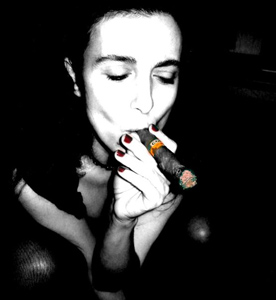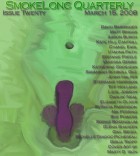How does the title work with the story?
When selecting a title, I try to find a concept that represents the essence of the tale, the core of the narrator’s experience. ‘Slam’ encapsulates for me the clumsiness inherent in this mother’s attempts at tenderness. I hope it expresses the feeling of a woman attempting to mother despite great odds, and her sense of life slamming into her and her child as they jolt against the violence hurled their way.
I love the images of the scars—the faint, silvery fish, and the purple slugs in serried ranks. A fish and slugs… Creatures…
One of the joys of writing is having a reader discover elements that appear unbidden and arrived in the writing unintended. Writing flash often has a mysterious quality to it. It works in layers, arrives with veils. I hadn’t noticed the presence of the creatures until you pointed them out, but they work because motherhood is a slippery fish.
The ending fascinates me. It’s a struggle between hope and despair. The daughter crumples the drawings and throws them in the garbage; the mother retrieves them, irons them out. The conflict, in essence, continues, but the final image is one of hope. Do you believe fiction should end on a positive note?
Robert Burdette Sweet in Writing Towards Wisdom: The Writer as Shaman (Helios, 1990) writes: “The main characteristic of creative persons is an enormous tolerance for ambiguity. Permit yourself not to know. You are writing the story to find out what happens and why. Since the story is writing itself, you can’t know the ending. You can’t know the middle. You might not know the beginning.”
I think the obsession with positive endings is a measure of our discomfort with ambiguity. You perceive the mother’s ironing as a hopeful gesture. I see it as her sensing that she might have only frumpled scraps if her daughter makes another bid for the Ancestors.
Ambiguous endings open the door for co-creation of meaning with the reader.
When will your flash fiction collection 100 Papers be out?
Hopefully it is going to layout this week and will be with the printer by the end of March. My publisher is hoping to launch it at the Cape Town Book Fair in June this year.
While reading through the annual Kathy Fish Fellowship applications, I was struck by the number of writers who were using flash as, to paraphrase, a means to an end. Most people weren’t writing flash because they loved the form, because it took them places other types of fiction didn’t. Instead, they were using it as a gateway into longer works—short stories, short story collections, novels. As a champion of flash, I found this discouraging. Is flash fiction less satisfying, in terms of either writing or reading, than longer works? Or is it that the markets still haven’t accepted flash as a legitimate form? Why do you write flash, and where do you see it taking you?
I agree that flash is an art form that isn’t well understood. My view is that like a miniature painting, it’s complete unto itself. Like a miniature it doesn’t reveal its full magnitude in one glance. If I were more academically inclined I would turn my MA research report into a PhD and take another six years to say as much, but that’s not my ambition. I can’t imagine flash being a gateway anywhere but to its own mysterious and shifty core. My sense is that the best flash is content to be only itself, inviting the reader to reflect and get in closer.
I suspect that writers loading the form with grander expectations struggle to write flash. That said, I think writing flash fiction is an excellent discipline that teaches economy and refines the poetic imagination. This precision benefits every other writing form one might engage in.
Like pianists who practise scales and arpeggios, I think every writer should practise flash regularly. But the analogy is ailing because flash is so much lovelier than even the most sparkling scales.
Why do you write flash, and where do you see it taking you?
In the words of Steve Biko, “I write what I like.”
Flash fiction takes me on a journey of discovery and surprise every time I venture to part its diaphanous exterior. It is a seductive form that steals hours from my week if I let it. Yet, even as I am robbed and consumed, I am returned to a creative space of disproportionate delight and inventive bliss.



 The SmokeLong Grand Micro Contest (The Mikey) is now an annual competition celebrating and compensating the best micro fiction and nonfiction online.
The SmokeLong Grand Micro Contest (The Mikey) is now an annual competition celebrating and compensating the best micro fiction and nonfiction online.